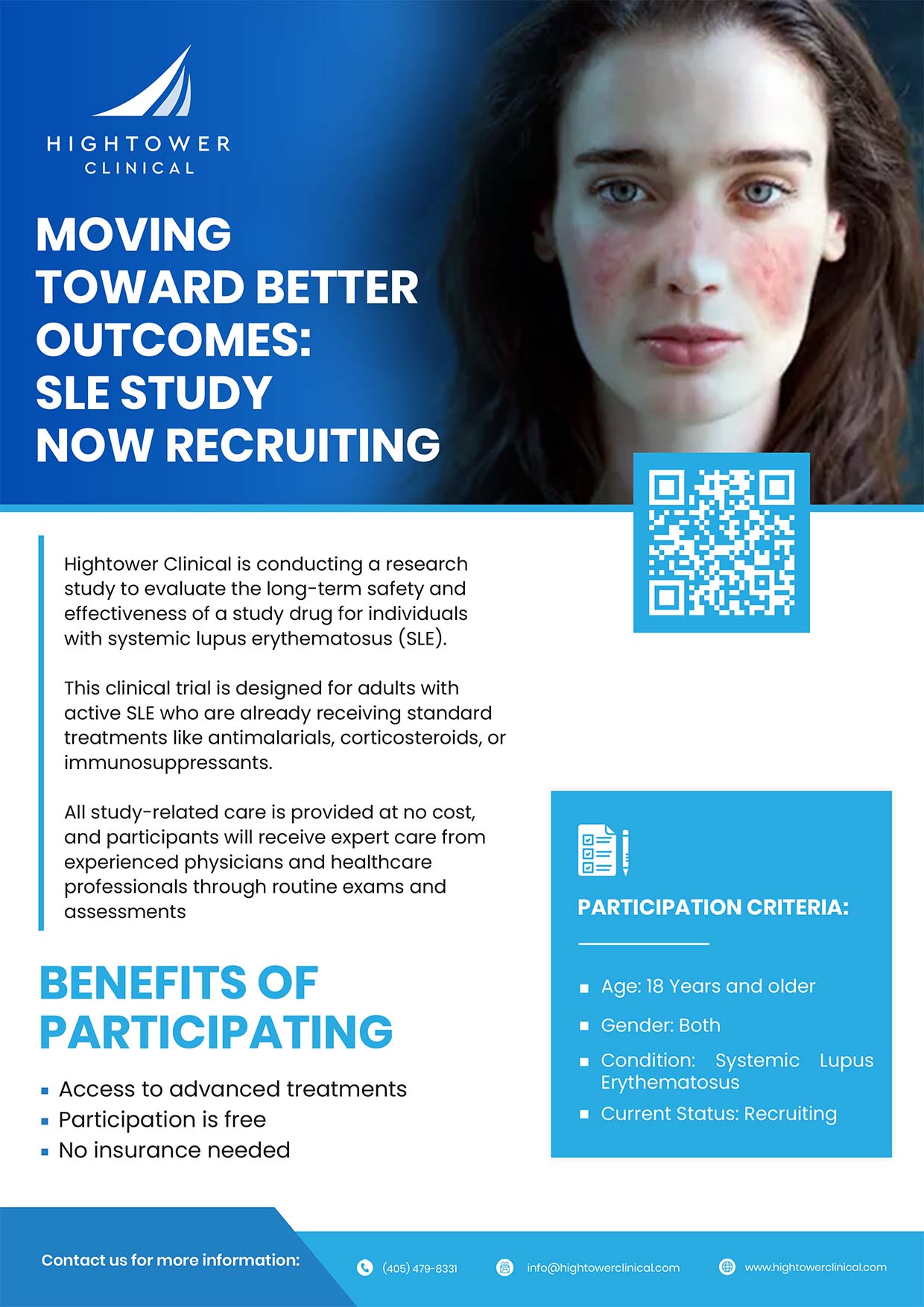Lupus symptoms and their severity vary from person to person, but with proper care, many individuals can manage the condition effectively. Most people with lupus go on to live long, fulfilling lives.
Systemic Lupus Erythematosus Clinical Trials
Hightower Clinical is conducting systemic lupus erythematosus (SLE) clinical trials to discover new and effective treatment options for those living with SLE.
Enroll Now
Living with Lupus?
See How Clinical Trials May Help
Lupus is a chronic autoimmune disease where your immune system mistakenly attacks healthy tissues, causing inflammation throughout the body. This condition can affect multiple organs, including the skin, blood, joints, kidneys, brain, heart, and lungs. The most common type is called systemic lupus erythematosus (SLE), which impacts the entire body.
Lupus affects women far more often than men, with about 90% of cases occurring in females. Symptoms can vary and may come and go over time. It’s important to consult a healthcare provider if you notice new pain, rashes, hair loss, or skin and eye changes.
To help advance treatment options, Hightower Clinical is currently conducting a clinical trial to evaluate the safety and efficacy of a study drug in participants diagnosed with systemic lupus erythematosus (SLE).
Peripheral Vascular Disease
| Study Name | Protocol Number | Sponsor |
|---|---|---|
| Systemic Lupus Erythematosus | 230LE303 | Biogen |
Explore a Potential New Treatment Option for Systemic Lupus Erythematosus (SLE)
Hightower Clinical is conducting a research study for individuals with systemic lupus erythematosus (SLE) to evaluate the long-term safety and effectiveness of an investigational drug. The study is open to adults with active SLE who have completed a previous related trial and are on standard treatments like corticosteroids or immunosuppressants.
Qualified participants will receive all study-related care at no cost and be closely monitored by experienced physicians through regular health assessments and exams.
SLE is a chronic autoimmune condition that causes widespread inflammation and affects various organs. Common symptoms include joint pain, fatigue, rashes, and sensitivity to sunlight.
If you’re living with SLE and want to explore potential treatment options, filling out the form is the first step to see if you qualify.
Study Participation: What to Know
If you decide to participate in the systemic lupus erythematosus (SLE) clinical study, simply fill out the form above. A member of the study team will reach out to you to discuss the details and determine your eligibility. They will review the study information with you to see if you qualify for this potential treatment option for SLE.
This clinical study aims to evaluate the long-term safety and effectiveness of a potential treatment for individuals with systemic lupus erythematosus (SLE) who have active disease and are already receiving standard of care treatments such as antimalarials, corticosteroids, or immunosuppressants. It is an extension of earlier studies and is open to participants who completed the treatment periods of those previous trials.
All study-related care is provided at no cost, and participants will be monitored closely by experienced physicians and qualified healthcare professionals through comprehensive physical exams and regular assessments.


Age
18 Years and older
Gender
Both
Condition
Systemic Lupus Erythematosus
Current Status
Recruiting
Symptoms of Systemic Lupus Erythematosus (SLE)
SLE symptoms can vary widely from person to person and often come and go. While almost everyone with SLE experiences joint pain and swelling at some point, other symptoms may affect different organs and systems in the body.
Common Symptoms Include:
Joint pain and swelling, especially in the fingers, hands, wrists, and knees
- Fatigue
- Unexplained fever
- Chest pain when taking deep breaths
- General discomfort or a constant ill feeling (malaise)
- Hair loss
- Weight loss
- Mouth sores
- Sensitivity to sunlight
- Skin rash — particularly a “butterfly” rash across the cheeks and nose, seen in about half of patients
- Swollen lymph nodes
Some individuals may only experience symptoms on their skin, a form known as discoid lupus. Because lupus affects multiple systems, symptoms can overlap with other conditions, making early detection and diagnosis essential. If you notice any of the above signs, consult a healthcare provider for a proper evaluation.
FAQS
How to avoid lupus?
Lupus can’t be prevented, as its exact cause remains unknown. However, if one of your biological parents has lupus, it’s a good idea to speak with a healthcare provider to understand your potential risk.
Am I eligible to participate in the clinical trial for Systemic Lupus Erythematosus (SLE)?
Eligibility depends on several factors, including your medical history, current symptoms, and whether you’ve completed a previous related study. A member of the study team will review these details with you to determine if you qualify.




